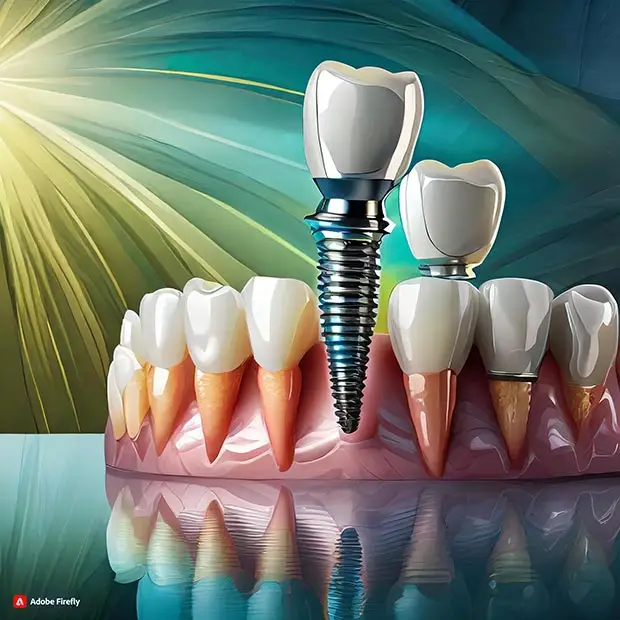A Comprehensive Guide to Understanding Costs and Financial Considerations
Embarking on the journey of dental implant treatment involves not only considerations of oral health but also comprehensive financial planning. Delve into the intricacies of dental implant costs to make informed decisions about your dental care.
Exploring Dental Implant Costs
The cost of dental implants varies based on several factors, including:
- Number of Implants: The quantity of implants required directly impacts the overall cost of treatment. Single-tooth replacements differ from full-mouth restorations.
- Implant Material: Implants can be crafted from various materials, such as titanium or zirconia, each with its cost implications. Titanium implants are more commonly used due to their durability and biocompatibility.
- Additional Procedures: Preparatory procedures like bone grafting or sinus lifts, necessary for implant placement, contribute to the total cost. These procedures may be required to ensure a stable foundation for the implants, especially in cases of bone loss or inadequate jaw structure.
- Implant Brand: Different brands offer implants with varying features and price points, influencing the overall cost of treatment. While generic implants may be more affordable, premium brands often offer advanced technologies and longer warranties, which can affect pricing.
- Geographic Location: Dental care costs can vary significantly by region, with factors like local market dynamics, cost of living, and practitioner expertise affecting prices. Urban areas and regions with higher demand for dental services may have higher treatment costs compared to rural areas.
Understanding Average Costs
On average, a single dental implant’s cost ranges from $1,000 to $3,000, excluding supplementary procedures or restorations. Overall treatment expenses, encompassing consultations, surgery, and prosthetic attachments, may range from $3,000 to $6,000 per tooth. However, these costs can vary widely depending on the factors mentioned above.
Considering Long-Term Benefits
Despite the initial investment, dental implants offer long-term advantages that justify their cost. These include:
- Durability: Dental implants are designed to be a permanent solution for missing teeth, providing a stable and long-lasting restoration.
- Natural Aesthetics: Implants closely mimic the appearance and function of natural teeth, offering a seamless and aesthetically pleasing smile.
- Improved Oral Health: Unlike traditional tooth replacements like dentures or bridges, implants preserve the integrity of the jawbone and adjacent teeth, promoting better oral health in the long run.
Financial Planning and Options
To alleviate the financial burden associated with dental implant treatment, many dental practices offer financing plans or payment options. These may include:
- Payment Plans: Flexible payment plans allow patients to spread the cost of treatment over time, making it more manageable within their budget.
- Insurance Coverage: Some dental insurance plans may provide partial coverage for dental implant procedures. However, coverage can vary widely, so it’s essential to check with your insurance provider beforehand.
- Health Savings Accounts (HSAs) or Flexible Spending Accounts (FSAs): These accounts allow individuals to set aside pre-tax dollars for eligible medical expenses, including dental implants.
Conclusion
Understanding the intricacies of dental implant costs empowers individuals to make well-informed decisions about their oral health. By considering long-term benefits, exploring financial avenues, and collaborating with a trusted dental provider, patients can embark on their dental implant journey with confidence and financial peace of mind.
Frequently Asked Questions (FAQs) About Dental Implants.
What are dental implants, and how do they work?
Dental implants are titanium posts surgically inserted into the jawbone to serve as artificial tooth roots. They provide a sturdy foundation for dental prosthetics, such as crowns, bridges, or dentures, restoring both function and aesthetics to the smile.
How long do dental implants last?
Dental implants are designed to be a long-term solution for tooth replacement, with proper care and maintenance. Studies indicate that they can last up to 20 years or more, making them a durable and reliable option for restoring missing teeth.
Are dental implants painful?
While discomfort during the implant procedure is minimal due to anesthesia, some patients may experience soreness or mild discomfort in the days following surgery. However, pain can typically be managed with over-the-counter pain relievers prescribed by your dentist.
Who is a suitable candidate for dental implants?
Ideal candidates for dental implants are individuals with good oral health, adequate jawbone density, and overall general health. Your dentist will conduct a thorough examination to determine if you’re a suitable candidate for implant surgery.
Can dental implants fail?
While dental implants have a high success rate, complications can occur, leading to implant failure. Factors such as poor oral hygiene, smoking, underlying health conditions, and inadequate bone density can increase the risk of implant failure.
How much do dental implants cost?
The cost of dental implants varies depending on factors such as the number of implants needed, additional procedures required, implant materials, and geographic location. On average, the cost of a single dental implant ranges from $1,000 to $3,000, excluding associated procedures.
Is dental implant surgery safe?
Dental implant surgery is considered safe when performed by a qualified and experienced dental professional. However, like any surgical procedure, there are risks involved, including infection, nerve damage, and implant failure. Your dentist will discuss potential risks and benefits before treatment.
Can dental implants be covered by insurance?
While some dental insurance plans may offer partial coverage for dental implant procedures, coverage can vary widely. It’s essential to check with your insurance provider to understand your coverage options and any out-of-pocket expenses you may incur.
How do I care for dental implants?
Proper oral hygiene is crucial for maintaining dental implants. Brushing and flossing regularly, along with routine dental check-ups, can help prevent complications and prolong the lifespan of your implants. Your dentist may also recommend special oral care products tailored to implant maintenance.
Can I eat normally with dental implants?
Yes, one of the significant advantages of dental implants is that they function and feel like natural teeth, allowing you to eat a wide variety of foods comfortably. However, it’s advisable to avoid excessively hard or sticky foods that could potentially damage the implants or surrounding tissues.

